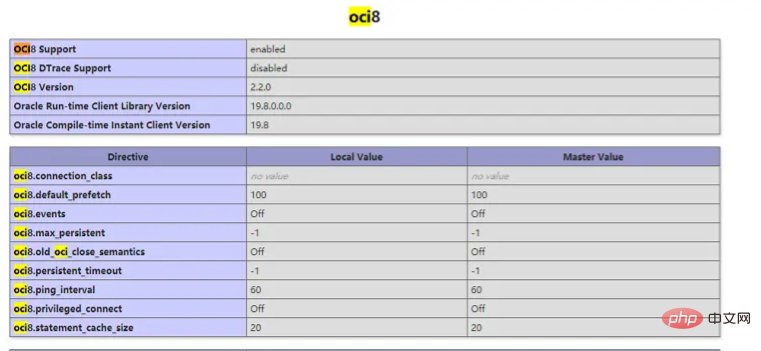 Backend Development
Backend Development
 PHP Tutorial
PHP Tutorial
 How to connect to oracle database in php7.2? Installation of OCI8 extension
How to connect to oracle database in php7.2? Installation of OCI8 extension
How to connect to oracle database in php7.2? Installation of OCI8 extension
How to connect to oracle database in php7.2? The following article will introduce to you how to install OCI8 extension to support Oracle database in php7.2. I hope it will be helpful to you!

When working on a project, the remote Oracle database provides us with an intermediate table. Some data in my business needs to go to this intermediate table in the Oracle database. table to query.
PHP connects to oracle database. Requires the OCI8 extension. I am ashamed to say that after so many years of working, I have never used an Oracle database seriously.
The syntax of mysql database is different from that of oracle database. Don’t just use mysql syntax to operate oracle database like me...it’s a bit embarrassing...
Today we Roughly record the installation process of OCI8 extension.
1: Download file
1: Oracle official website download address:
http://www.oracle.com /technetwork/topics/linuxx86-64soft-092277.html
Download file (check the file name):
oracle-instantclient19.8-basic-19.8.0.0.0-1.x86_64.rpm oracle-instantclient19.8-devel-19.8.0.0.0-1.x86_64.rpm复制代码
2 : PHP official website download address :
https://www.php.net/manual/zh/oci8.installation.php
PHP-OCI8 plug-in
Download command:
wget http://pecl.php.net/get/oci8-2.2.0.tgz
It is recommended to put the above three files into the /opt directory. Of course, you are free to put them where exactly. Just find it.
Two: Installation
1 : Install oracle plug-in
rpm -ivh oracle-instantclient11.2-basic-11.2.0.4.0-1.x86_64.rpm rpm -ivh oracle-instantclient11.2-devel-11.2.0.4.0-1.x86_64.rpm
may be Error:
ImportError: libaio.so.1: cannot open shared object file: No such file or directory”
The reason for the error has been given above. The libiao plug-in is missing, solution:
yum install libaio
2 : Install the OCI8 plug-in
(1): Unzip the tar package:
tar -zxf oci8-2.2.0.tgz
(2): Enter the decompression directory
cd oci8-2.2.0
(3): Run the command:
phpize
When running, the following error may occur: Can't find PHP headers in /usr/include/php The php-devel package is required for use
Solution
yum install php72w-devel #注意一下,这条命令取决你安装的PHP版本,我这个命令并不适用所有人
(4): Use $ORACLE_HOME or Instant Client to configure the package
./configure --with-oci8=shared,instantclient,/usr/lib/oracle/<version>/client/lib</version>
or
./configure -with-oci8=shared,$ORACLE_HOME
(5): Execute compilation and installation:
make install
An error may be reported here:
make: ** * No rule to make target build', needed by default'. Stop.
Solution:
1: Install the following configuration:
yum -y install make zlib-devel gcc-c++ libtool openssl openssl-devel
2: Re configure
./configure
3: Compile
make && make install
(6): Configure php.ini
We add
extension=oci8.so
to restart PHP
systemctl restart php-fpm
systemctl restart nginx
PHPinfo();As shown below:

PHP Video Tutorial"
The above is the detailed content of How to connect to oracle database in php7.2? Installation of OCI8 extension. For more information, please follow other related articles on the PHP Chinese website!

Hot AI Tools

Undresser.AI Undress
AI-powered app for creating realistic nude photos

AI Clothes Remover
Online AI tool for removing clothes from photos.

Undress AI Tool
Undress images for free

Clothoff.io
AI clothes remover

AI Hentai Generator
Generate AI Hentai for free.

Hot Article

Hot Tools

Notepad++7.3.1
Easy-to-use and free code editor

SublimeText3 Chinese version
Chinese version, very easy to use

Zend Studio 13.0.1
Powerful PHP integrated development environment

Dreamweaver CS6
Visual web development tools

SublimeText3 Mac version
God-level code editing software (SublimeText3)

Hot Topics
 1378
1378
 52
52
 PHP's Current Status: A Look at Web Development Trends
Apr 13, 2025 am 12:20 AM
PHP's Current Status: A Look at Web Development Trends
Apr 13, 2025 am 12:20 AM
PHP remains important in modern web development, especially in content management and e-commerce platforms. 1) PHP has a rich ecosystem and strong framework support, such as Laravel and Symfony. 2) Performance optimization can be achieved through OPcache and Nginx. 3) PHP8.0 introduces JIT compiler to improve performance. 4) Cloud-native applications are deployed through Docker and Kubernetes to improve flexibility and scalability.
 PHP: A Key Language for Web Development
Apr 13, 2025 am 12:08 AM
PHP: A Key Language for Web Development
Apr 13, 2025 am 12:08 AM
PHP is a scripting language widely used on the server side, especially suitable for web development. 1.PHP can embed HTML, process HTTP requests and responses, and supports a variety of databases. 2.PHP is used to generate dynamic web content, process form data, access databases, etc., with strong community support and open source resources. 3. PHP is an interpreted language, and the execution process includes lexical analysis, grammatical analysis, compilation and execution. 4.PHP can be combined with MySQL for advanced applications such as user registration systems. 5. When debugging PHP, you can use functions such as error_reporting() and var_dump(). 6. Optimize PHP code to use caching mechanisms, optimize database queries and use built-in functions. 7
 PHP vs. Python: Core Features and Functionality
Apr 13, 2025 am 12:16 AM
PHP vs. Python: Core Features and Functionality
Apr 13, 2025 am 12:16 AM
PHP and Python each have their own advantages and are suitable for different scenarios. 1.PHP is suitable for web development and provides built-in web servers and rich function libraries. 2. Python is suitable for data science and machine learning, with concise syntax and a powerful standard library. When choosing, it should be decided based on project requirements.
 PHP vs. Other Languages: A Comparison
Apr 13, 2025 am 12:19 AM
PHP vs. Other Languages: A Comparison
Apr 13, 2025 am 12:19 AM
PHP is suitable for web development, especially in rapid development and processing dynamic content, but is not good at data science and enterprise-level applications. Compared with Python, PHP has more advantages in web development, but is not as good as Python in the field of data science; compared with Java, PHP performs worse in enterprise-level applications, but is more flexible in web development; compared with JavaScript, PHP is more concise in back-end development, but is not as good as JavaScript in front-end development.
 PHP: The Foundation of Many Websites
Apr 13, 2025 am 12:07 AM
PHP: The Foundation of Many Websites
Apr 13, 2025 am 12:07 AM
The reasons why PHP is the preferred technology stack for many websites include its ease of use, strong community support, and widespread use. 1) Easy to learn and use, suitable for beginners. 2) Have a huge developer community and rich resources. 3) Widely used in WordPress, Drupal and other platforms. 4) Integrate tightly with web servers to simplify development deployment.
 How to create oracle dynamic sql
Apr 12, 2025 am 06:06 AM
How to create oracle dynamic sql
Apr 12, 2025 am 06:06 AM
SQL statements can be created and executed based on runtime input by using Oracle's dynamic SQL. The steps include: preparing an empty string variable to store dynamically generated SQL statements. Use the EXECUTE IMMEDIATE or PREPARE statement to compile and execute dynamic SQL statements. Use bind variable to pass user input or other dynamic values to dynamic SQL. Use EXECUTE IMMEDIATE or EXECUTE to execute dynamic SQL statements.
 How to create cursors in oracle loop
Apr 12, 2025 am 06:18 AM
How to create cursors in oracle loop
Apr 12, 2025 am 06:18 AM
In Oracle, the FOR LOOP loop can create cursors dynamically. The steps are: 1. Define the cursor type; 2. Create the loop; 3. Create the cursor dynamically; 4. Execute the cursor; 5. Close the cursor. Example: A cursor can be created cycle-by-circuit to display the names and salaries of the top 10 employees.
 How to read the oracle awr report
Apr 11, 2025 pm 09:45 PM
How to read the oracle awr report
Apr 11, 2025 pm 09:45 PM
An AWR report is a report that displays database performance and activity snapshots. The interpretation steps include: identifying the date and time of the activity snapshot. View an overview of activities and resource consumption. Analyze session activities to find session types, resource consumption, and waiting events. Find potential performance bottlenecks such as slow SQL statements, resource contention, and I/O issues. View waiting events, identify and resolve them for performance. Analyze latch and memory usage patterns to identify memory issues that are causing performance issues.



